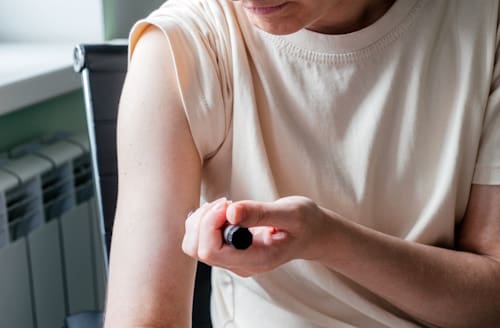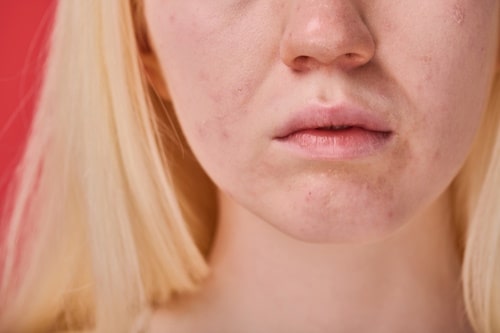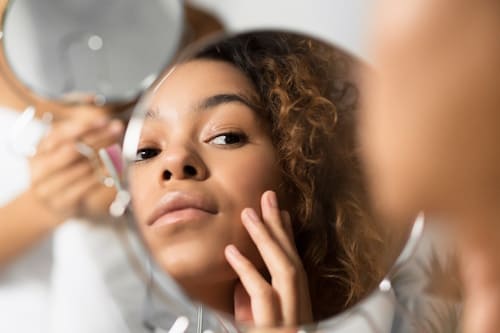You've probably heard much about diabetes and its impact on various body parts, like the eyes, kidneys, and heart. But did you know that diabetes can also affect your skin?
Acne is a common skin condition millions worldwide experience, yet its relationship with diabetes remains lesser-known. This article will navigate the link between diabetes and acne, exploring the various factors, symptoms, and preventative measures you can take.
Also read: How to choose the best acne treatment
Biggest Take-Aways:
- The relationship between diabetes and acne is complex but can be managed with lifestyle choices, dietary habits, and specialized skincare.
- High blood sugar levels can aggravate skin conditions, making diabetes management crucial for good skin health.
- Diet, including omega-3 fats, plays a significant role in controlling inflammation related to both diabetes and acne.
- Exposed Skin Care provides a balanced and effective regimen for tackling the challenges of managing both diabetes and acne simultaneously.

What is Diabetes?
Diabetes is a chronic medical condition characterized by high blood glucose (sugar) levels. There are two main types of diabetes: type 1 diabetes and type 2 diabetes. In type 1 diabetes, the body cannot produce insulin, the hormone that helps regulate blood sugar levels.
Type 2 diabetes, on the other hand, is characterized by insulin resistance, where the body does not effectively use the insulin it produces. Both types can result in high blood sugar levels, affecting various organs and tissues, including the skin.
What is Acne?
Acne, or acne vulgaris, is a skin condition that occurs when hair follicles are clogged with oil (sebum) and dead skin cells. It can manifest as blackheads, whiteheads, pimples, and even cysts. It usually impacts the face but can also appear on the chest, back, and upper arms.
How Are Diabetes and Acne Connected?
Understanding Blood Sugar Impact on Skin Health
Blood sugar levels have a direct impact on skin health. High blood sugar levels can lead to various skin problems, including dry and itchy skin, skin lesions, and infections. Moreover, diabetes can cause poor circulation, particularly in the lower legs and feet, further impacting skin health.

The Role of Insulin
Insulin is a hormone that helps cells absorb glucose from the bloodstream. However, insulin also stimulates sebaceous glands to produce more sebum, leading to acne. This is often observed in people with insulin resistance, a condition related to diabetes.
Immunity and Inflammatory Skin Conditions
People with diabetes tend to have a weakened immune system, making them more susceptible to staphylococcus aureus and other bacterial infections that can exacerbate acne. Conditions like folliculitis and staphylococcus-related pimples are more common in diabetic individuals.
Obesity and Acne
Obesity is a risk factor for developing type 2 diabetes. High amounts of body fat can lead to insulin resistance, which, as mentioned earlier, can result in acne.
How to Identify Diabetes-Related Acne
Check for Dry and Itchy Skin
Diabetes often leads to skin that is dry and itchy. If you notice these symptoms alongside acne, it may be indicative of how diabetes is affecting your skin.

The Rash and Fungal Infections Signal
People with diabetes are also prone to skin diseases like psoriasis and fungal infections, which can accompany acne. This makes for a unique pattern of skin issues not commonly seen in people without diabetes.
Examine Your Lower Legs and Feet
Poor circulation due to diabetes often impacts the skin on the lower legs and feet. If you notice any changes in this area along with acne, it's worth considering the role of diabetes.
Dietary Factors: What to Eat and What to Avoid
Good Foods for Managing Diabetes and Acne
- Nuts and Seeds: Rich in zinc and selenium, these can boost your immunity and collagen production, helping both diabetes and acne.
- Omega-3 Fatty Acids: Found in fatty fish, these acids help to reduce inflammation and promote good skin health.
- Brown Rice and Whole Grains: Unlike white rice and white bread, these options have a low glycemic index and help regulate blood sugar.
Foods to Avoid
- Processed Foods and Trans Fats: These can increase inflammation and are also high in sugar, contributing to both diabetes and acne.
- High-Glycemic Foods: Foods like white bread and white rice can spike blood sugar levels, increasing the risk of acne and diabetes complications.

Nutritional Needs and Supplements
Supplementing with Vitamin E and zinc can be beneficial. However, always balance your dietary supplements according to your diabetic needs.
Lifestyle Choices to Manage Diabetes-Related Acne
Here are some ways to prevent acne from diabetes:
- Regular Monitoring of Blood Sugar: Checking your blood sugar regularly helps you manage your diabetes, which helps control related skin problems.
- Physical Activity: Exercise is one of the best approaches to managing blood sugar and insulin levels, thereby controlling both diabetes and acne.
- Reducing Stress: High stress levels may aggravate hormonal fluctuations and blood sugar levels, leading to acne and worsening diabetes.
Using Exposed Skin Care to Manage Diabetes-Related Acne
Managing acne can be daunting, especially for people with diabetes who already have to manage their blood glucose levels diligently. Exposed Skin Care products offer a comprehensive solution to tackle acne effectively while being mindful of other health parameters.
Here are some compelling benefits of Exposed Skin Care:
- Preventing Skin Infections: People with diabetes are at a higher risk for skin infections. Exposed Skin Care products are designed to ward off infections effectively, reducing the risk of complications like blisters, skin cancer, and even fungal issues in sensitive areas like the armpit and vaginal regions.
- Moisture Complex: Dry skin can be an issue for diabetics and can also contribute to acne. This product hydrates without clogging the pores, thus balancing skin moisture effectively.
- Microderm Scrub and Derm-X Cloth: These exfoliating agents promote new skin formation, important for those managing blood sugar levels as they help in the faster healing of any skin lesions or yellowish acne scars.
- Probiotic Complex: This unique component is designed to balance sebum production, which is especially beneficial for indirectly managing glucose and triglyceride levels.
So, whether you're dealing with yellowish acne scars or concerned about the impact of diabetes on your skin, Exposed Skin Care offers an integrative, scientifically backed approach to skin health.
Conclusion
Managing the intricate relationship between diabetes and acne requires a comprehensive understanding of various factors, including blood sugar levels, dietary habits, and even the role of insulin.
The importance of omega-3 fats in reducing inflammation, coupled with the need to avoid high-glycemic foods that most people eat, highlights the role of diet in this context. Exercise, stress management, and regular blood sugar monitoring are key lifestyle choices that can make a substantial difference.
Each complements the other in achieving a holistic approach to managing diabetes and acne. This becomes all the more essential given the potential complications such as metabolic syndrome and endocrine-related issues, which can impact both conditions.
Exposed Skin Care offers a balanced and effective skincare regime scientifically designed to tackle multiple fronts of this issue. It's a testament to how specialized care can make a difference in managing complex health conditions.
It is an integral part of a multi-faceted approach to tackling diabetes and acne. The goal is not just to treat the symptoms but to adopt a lifestyle and skincare routine that addresses the root causes, enabling you to live a healthier, happier life.
FAQs
How are diabetes and acne related?
Diabetes and acne can be interconnected due to fluctuations in blood sugar levels, leading to hormonal imbalances and inflammation, fostering acne development.
Can high blood sugar levels cause skin problems?
Yes, high blood sugar levels can lead to various skin problems, including dryness, infections, and acne.
Is acne more prevalent in people with diabetes?
Acne is not necessarily more prevalent in people with diabetes, but diabetes can exacerbate existing skin conditions, including acne.
What role do omega-3 fats play in managing diabetes and acne?
Omega-3 fats can help reduce inflammation, which is beneficial for controlling blood sugar levels and managing acne.
How can Exposed Skin Care help in managing diabetes-related acne?
Exposed Skin Care offers a scientifically-backed, comprehensive skincare routine designed to address both acne and the factors that can worsen it for people with diabetes.



















